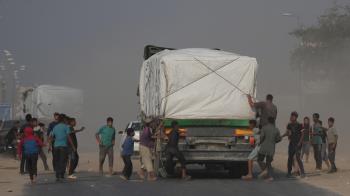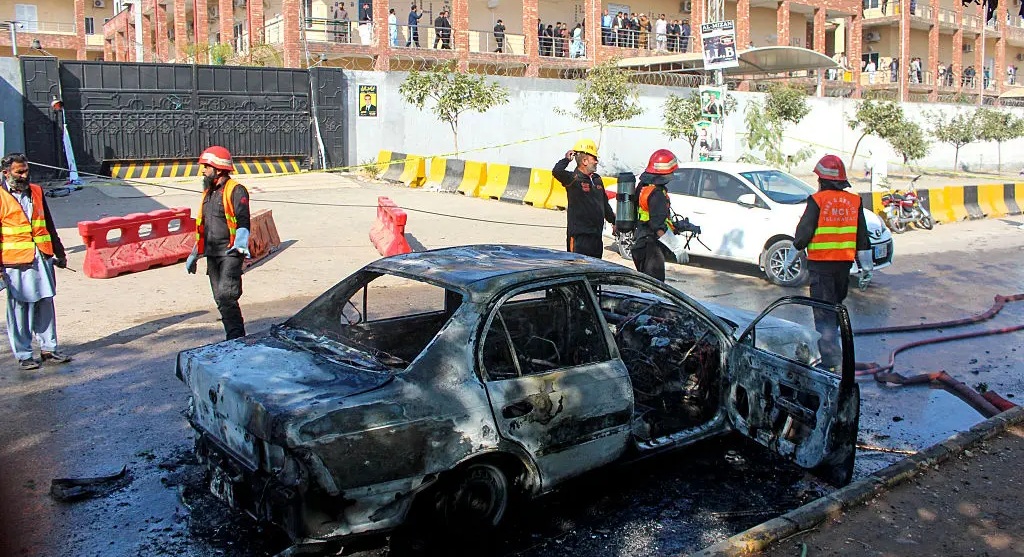Alwaght- A day after deadly bombing that rocked New Delhi, a suicide blast in Islamabad killed at least 12, including 4 security forces. Pakistani officials were fast to point their fingers at two of their neighbors. Interior minister commented on the details of the incident, saying that the suicide attacker did not manage to break into the court building, but he detonated himself outside the building and near a police vehicle.
Mohsen Reza Naqvi added that the incident was not an ordinary bombing and is being investigated through various aspects. According to the reports, tens of lawyers, judges, and defendants were present when the blast occurred, and the assailant was killed at the scene.
Blaming Afghanistan and India
Following a suicide bombing in Islamabad on Tuesday, Pakistani officials simultaneously pointed the finger at both of its neighbors.
Finger Pointed at Kabul: Just hours after the blast,Pakistan's Defense Minister, Khawaja Asif, took to X to directly accuse Kabul. "We are in a state of war," Asif declared. He warned that anyone believing the Pakistani military is only engaged in combat in the border regions with Afghanistan or remote areas of Balochistan should take the suicide attack in the heart of Islamabad as a "serious warning."
He further stated: "in such an environment, nurturing high hopes for successful negotiations with the rulers in Kabul is futile." Asif asserted that the rulers in Kabul have the power to stop terrorism in Pakistan, but by allowing this war to be brought to the capital, they are sending a message," one that Pakistan has the full capacity to answer."
Tensions between Pakistan and Afghanistan have soared in recent weeks, with the two countries carrying out reciprocal airstrikes. Islamabad accuses the Taliban-led government of Afghanistan of supporting and sheltering Tahreek-i-Taliban Pakistan (TTP) leaders, a charge Kabul categorically denies. With the collapse of Qatar and Turkey-mediated talks, Islamabad has declared that "the Afghan Taliban have only given hollow promises and taken no action against TTP elements." In response, the Afghan Taliban issued a statement condemning the attacks in Islamabad and on a military academy.
India blamed, too: Pakistani Prime Minister Shehbaz Sharif also accused India of responsibility for the"suicide attack" in Islamabad, as well as an assault on a cadet college near the Afghan border. Sharif made the claims without providing any evidence, stating: "Both attacks are the worst examples of Indian state terrorism in the region... The time has come for the world to condemn India's nefarious plots. We will continue our war against them until we completely eradicate the scourge of terrorism."
Similarity of India and Islamabad blasts
The Islamabad incident occurred just one day after a deadly explosion in Delhi, which resulted in multiple casualties. The blast in India, which took place near the historic Red Fort in the capital, killed at least eight people.
No official statement has yet been released regarding the cause or perpetrators of the incident, and police have launched a comprehensive investigation under India's primary anti-terrorism law. However, the pattern of the Pakistan explosion bears significant resemblance to the pattern of the previous day's blast in India. This similarity has led some to connect the Islamabad explosion with the prior day's incident in India, raising the possibility of India's potential involvement in the Islamabad blast.
TTP's splinter group responsible for suicide attack
One day after the deadly Islamabad bombing, Jamaat-ul-Ahrar, a breakaway faction of the TTP, claimed responsibility for the attack inside the judicial complex in Islamabad's G-11 sector.
Meanwhile, the main TTP issued a statement denying any involvement, declaring itself "absolved" of the incident.
Jamaat-ul-Ahrar is listed as a terrorist group by the UN. The UN has stated that the group, which splintered from the TTP, is based in the Lalpura district of Afghanistan's Nangarhar province. It was formed in August 2014 following the merger of a TTP faction from the Mohmand region and the Ahrar-ul-Hind group.
Pakistan "in a state of war"
According to some reports, concurrent with the bombing in Islamabad, Pakistani forces have been engaged in intense combat since Monday with the TTP militants at a military academy in the western part of the country. The Pakistani army has announced the evacuation of over 350 people, but approximately 300 remain trapped.
Following the blast in Islamabad, the country's Defense Minister declared that Pakistan is in a "state of war" and emphasized that this attack will be met with a response.
Alarm bells set off to Islamabad
The Tuesday suicide blast occurred while Pakistan hosted the summit of the world parliament speakers, something raising the alarm about terror threats in the capital. The serene, green capital with a population of approximately one million is home to government institutions, foreign embassies, and international organizations. Experts warn that if Islamabad is not secure, then no place in Pakistan is safe. This marks the first major attack in the Pakistani capital in over a decade, signaling a resurgence of widespread violence and insurgency across the country.
According to the analysts, this attack is a new alarm to the security of Pakistan as before this the militia violence was majorly concentrated in the western border regions.



























